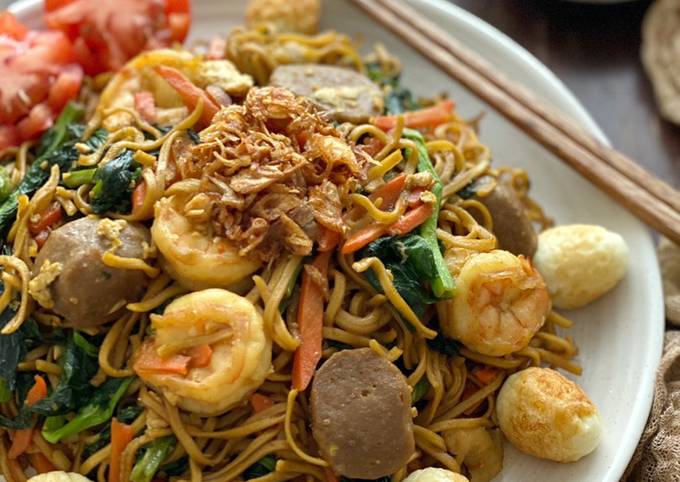Recipe: Yummy Chinese Birthday Noodles
Chinese Birthday Noodles. If you're an adult, do not celebrate your birthday. What Chinese Eat on Their Birthday: Longevity Noodles. Birthday noodles or 寿面 (shòumiàn) are not just ordinary noodles.
 It's the "longevity noodle" so we always eat it on birthdays and New Years. This noodle dish is also dubbed longevity noodles because it symbolizes long life. Serve this during birthdays and special celebrations—you can easily. Chinese Birthday Noodles very diverse and have mind sense that unique. Several types of Chinese Birthday Noodles recipes are also sufficient easy to process and do not pick up long. Although not everyone likes Chinese Birthday Noodles food, now some people are got attached and like the sundry Chinese Birthday Noodles foods on hand. This could be seen of the number of restaurants that supply Chinese Birthday Noodles as one of the dish. You can have Chinese Birthday Noodles using 16 ingredients and 7 steps. Here is how you cook it.
It's the "longevity noodle" so we always eat it on birthdays and New Years. This noodle dish is also dubbed longevity noodles because it symbolizes long life. Serve this during birthdays and special celebrations—you can easily. Chinese Birthday Noodles very diverse and have mind sense that unique. Several types of Chinese Birthday Noodles recipes are also sufficient easy to process and do not pick up long. Although not everyone likes Chinese Birthday Noodles food, now some people are got attached and like the sundry Chinese Birthday Noodles foods on hand. This could be seen of the number of restaurants that supply Chinese Birthday Noodles as one of the dish. You can have Chinese Birthday Noodles using 16 ingredients and 7 steps. Here is how you cook it.
Ingredients of Chinese Birthday Noodles
- Prepare 250 gr of homemade Chinese egg noodles.
- It's 1.5 Tbsp of oyster sauce.
- Prepare 2 Tbsp of sweet soy sauce.
- It's 3 Tbsp of vegetable oil.
- It's 5 cloves of garlic, roughly chopped.
- It's 8 of beef meatballs, halved.
- It's 200 gr of shrimp, peeled, deveined.
- Prepare 150 gr of chicken, diced.
- Prepare 2 of eggs, beaten.
- Prepare 2 of carrots, julienned.
- It's 150 gr of green mustard, cut into pieces.
- Prepare 50 ml of water.
- Prepare 1 tsp of salt or to taste.
- You need 1/2 tsp of white pepper powder or to taste.
- You need 10 of quail eggs, boiled, peeled, fried until browned.
- It's of fried shallots to taste for sprinkling.
Fried Chinese Birthday Noodles (Tsa Misua). Misua is a skinny salty Chinese noodle from Fujian province, where my ancestors are from. In China it is traditional to serve noodles at a birthday celebration. The Chinese version of 'Happy Birthday' is sang along to the same tune used in the west.
Chinese Birthday Noodles instructions
- Soak egg noodles with boiling water. Let stand for a while until soft. Drain well..
- Coat the noodles with oyster sauce and sweet soy sauce. Set aside. Heat the vegetable oil. Saute garlic until fragrant..
- Add beef meatballs, chicken and shrimp. Cook until it changes color. Set it aside on the edge of the pan..
- Add eggs. Stir to make scrambled eggs..
- Add carrots and mustard greens. Cook until wilted..
- Add noodles, salt and pepper. Add water. Stir well. Cook until done. Adjust to taste..
- Remove from the heat. Place it on a serving plate. Garnish quail eggs and sprinkle with fried onions. Serve warm. Yum 😋.
The long noodles represent the person's long life, although I'm fairly sure there is no competitive element to this! This noodle dish is also dubbed longevity noodles because it symbolizes long life. Serve this during birthdays and special celebrations—you can easily customize and add (or lessen). In Chinese culture noodles are served at birthdays as they symbolise long life. These noodles are brilliant for picnics and parties because they're easy to make for a crowd AND they stay warm for..for birthday parties.in China,while the cake is optional,noodles r a must. because noodles r long long life.the Chinese believe that if the birthday person eats noodles on this special day,he will.
To get ingredients for manufacture Chinese Birthday Noodles recipes is also not hard. You can easily get the main ingredients at the proximate supermarket and even on the market. There are much kinds of Chinese Birthday Noodles that are simple and quick to process into delicious dishes. You can constantly practice this Chinese Birthday Noodles recipe at home, and can provide it to your children and extended family. If you wish to cook different foods on our website, we supply various types of food recipes which are of certainly very delicious and enjoyable to enjoy, please try them.
No comments:
Post a Comment